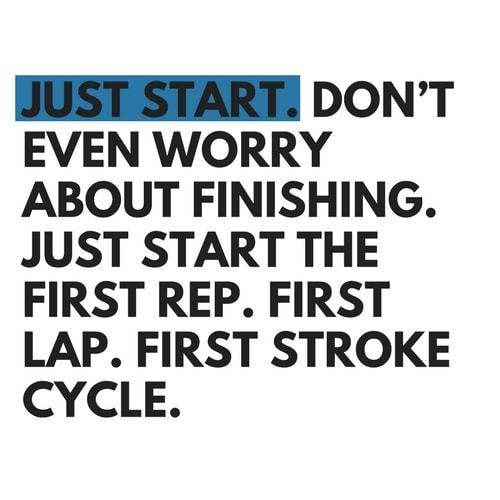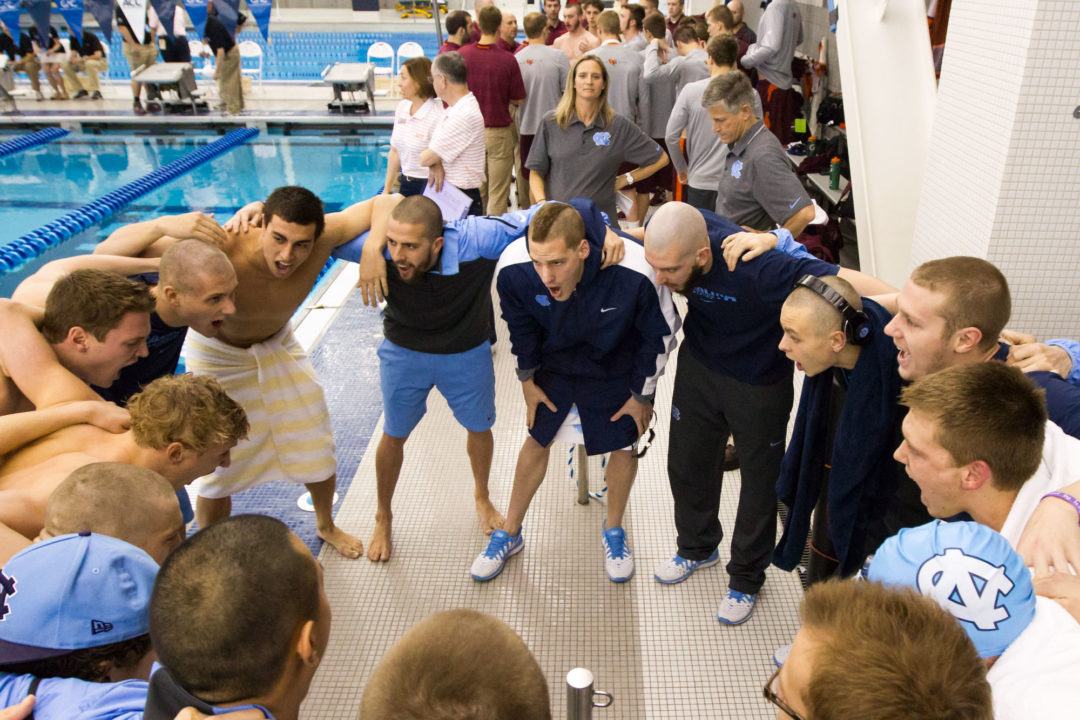by Olivier Poirier-Leroy. Join his weekly motivational newsletter for competitive swimmers by clicking here.
There are two classic problems swimmers experience:
“How do I make sure that I swim to the best of my ability at race time? (How do I make sure I don’t choke?)”
And…
“How can I get motivated to go to practice every day and train like a maniac?”
Both topics are covered extensively in our mental training book Conquer the Pool, but today let’s take a closer look at the motivational woes that are unique to practice.
The problem we run into is often the way we approach the problem of motivation: we are under the impression that we must be motivated before our big swim practices in order to go to the aquatic center, walk out onto the cold pool deck, hop in the water and drop a big workout.
But motivation is fleeting and fickle.
Just how much so?
Well, for starters, how much you slept last night affects how mentally tough you are today. How much stress you are experiencing plays a role. Your body language factors in to how aggressive you are going to be. Even how well you are feeding and hydrating yourself plays a role.
How motivated we feel from day to day depends on a heap of different things. Pros understand this and train anyway. They don’t wait for motivation to strike them: they choose to act, knowing that continued motivation is a by-product of taking consistent action towards their goals.
This sounds nice and fancy, but what can we do today to pour jet fuel onto the barely burning embers of motivation?
Here are some go-to techniques and tools that you can use daily to keep you motivated to go to practice all season long:
1. Do some strategic visualization work before you get in the water.
What’s more motivating than feeling good in the water? What is more rewarding than hitting some of that top-level speed without having to muscle and struggle through it?
That’s the power of visualization on our swim performance.
Visualization is an insanely powerful tool that you can use to calm racing anxiety. It can help you speed up skill acquisition (i.e. improve your technique faster). And wouldn’t ya know it—visualization even helps you to swim faster (and thereby get motivated) in practice too.
One study [1] found that mental imagery to be more powerful than traditional psych-up tactics like external self-talk.
Instead of trying to work yourself up before your big swim, spend some QT with the back of your eye lids and picture yourself swimming like a chlorinated champ.
2. What am I doing here again?
The glazed eyes are a dead giveaway. So are the hunched shoulders. The crossed arms. One or all, they constitute the physical symptoms of a swimmer that is mentally checked out.
It’s the swimmer who doesn’t have a reason to be there. They’ve seen the workout, and now with toes curled around the edge of the corner of the pool, they are hesitating as long as possible to get into the water to do a workout they aren’t invested in.
I’ve seen it a hundred times, and even experienced it firsthand—the workout that felt pointless.
To turn your focus around, and to turn the knob of motivation, start with some training goals. There is only so much your coach can do to get you engaged: at some point you need to take accountability for your training. And that means finding something to work on, even if you don’t see it written on the whiteboard.
At the very least, you should have a clear idea of what you want to accomplish in the water over the course of the season: “I’m showing up to practice because I want to crack a minute in the 100-backstroke next summer.”
More specifically to our daily workouts, there should be things that you are fixated on in the short term in order to improve. If you find yourself consistently disengaged in practice, sit down and spend five minutes writing out things you want to improve. Your underwaters. Better body position. Crushing your streamlines.
Don’t wait for someone else to give you purpose in training: find it for yourself. It’s your swimming, after all.
3. Don’t worry about “feeling like it”—focus on starting and seeing how it goes.
I cannot count how many times I stood on the edge of the pool deck, border-line shivering from the cold pool deck, and thought to myself: “I should just go home.”
Starting is the struggle. Always. Forever and always.
That hard set always gets easier once you have started.
The “impossible” workout doesn’t seem so impossible once we’ve finished it.
Under the sneaky guise of good intentions, our brain is flashing the red light at us when something that might cause us some hurt shows up on the horizon. It’s under the impression it’s doing you a solid by throwing down resistance.
“Oh, you don’t have to do this set,” it’ll whisper. “Just slow down a little, we’ve never gone this fast before, and it will probably leave us devastated.”

What’s the worst that could happen? Nothing. The best that could happen? You find that you are more capable than you thought.
The momentum from starting is greater than you realize. Your desire to finish something you have started is a powerful motivator in itself. And you will likely find that it wasn’t nearly as hard of a set as you thought it was gonna be.
Just start the workout.
The Next Step
It’s a sad reality that swimmers will waste large chunks of their season waiting on motivation to slap them across the face. Sure, there will be flurries of excited effort and motivation from time to time: after a successful meet, for example.
But that’s the mark of an amateur. Anyone can be motivated when things are going our way. Take your swimming to the next level by not needing motivation to do the things you know need done.
It’s during the random Thursday morning workout where the difference is made. It’s after the mid-season meet that goes badly.
It’s not once in a while, or when you feel like it, it’s every day.
ABOUT OLIVIER POIRIER-LEROY
Olivier Poirier-Leroy is a former national level swimmer. He’s the publisher of YourSwimBook, a ten-month log book for competitive swimmers.
 He’s also the author of the recently published mental training workbook for competitive swimmers, Conquer the Pool: The Swimmer’s Ultimate Guide to a High Performance Mindset.
He’s also the author of the recently published mental training workbook for competitive swimmers, Conquer the Pool: The Swimmer’s Ultimate Guide to a High Performance Mindset.
It combines sport psychology research, worksheets, and anecdotes and examples of Olympians past and present to give swimmers everything they need to conquer the mental side of the sport.
Ready to take your mindset to the next level?

Good article. A comment on this:
“…for starters, how much you slept last night affects how mentally tough you are today. How much stress you are experiencing plays a role. Your body language factors in to how aggressive you are going to be. …”
Yes but, certainly there have been days when I have gotten up after a lousy night of sleep, had a very stressful day, shuffled to the pool in a slouch and suffered through an abysmal workout performance, but there have been plenty of times when I have gotten up after a lousy night of sleep, had a very stressful day, shuffled to the pool in a slouch and had an astonishingly good practice. ‘wish… Read more »
Same. It’s really hard especially to get in the pool before I go to school. I’m only in 8th grade and it’s mentally and physically grueling to do this multiple times a week.